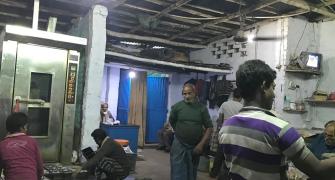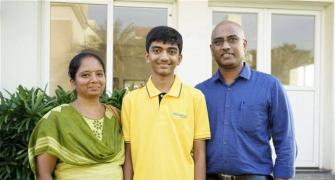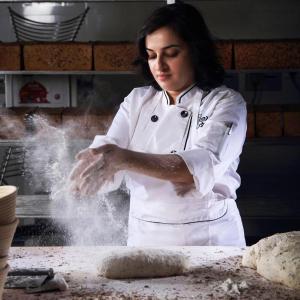'I worked over 100 times more to prove I wasn't a madamji doing this as a hobby.'

All photographs: Kind courtesy Gauri Varma/Facebook
A decade ago, Chef Gauri Varma quit her high-paying corporate job to pursue a career in baking and food innovation.
A mother to a toddler, the owner and founder of Confect -- a sugar paste brand -- and G's Patisserie in Delhi, she has been breathing new life into the cake business.
When she is not thinking about the next sugar paste she plans to launch, Gauri spends time whipping up delicious cakes with her 33-month-old son, who is also her food taster.
In an e-mail interview with Anita Aikara/Rediff.com, Gauri speaks of her role as a food innovator, juggling roles as a mother and entrepreneur, and why the ingredients that go into making cakes should be nothing but the best quality.
Why did you quit your marketing job and get into baking?
I was fortunate enough to work with some of the world's best companies across the globe for over a decade.
I closely observed the cake and bakery ingredients available in the Indian markets and was very disappointed with their quality, especially since it is widely consumed by kids.
I was very unhappy knowing that India was just a dumping ground for stuff that was not acceptable in other countries.
So I decided this was the place I wanted to make a difference.
I started to manufacture the products myself, and then gradually established G's Patisserie and Confect.
You lost your sense of smell at the age of 15.
A national-level swimmer, I have competed in the freestyle (50 m, 100 m, 200 m and 400m) category.
I was overweight back then, but was still very motivated to get to the finish line.
6 months of rigorous practice and training helped me go from a beginner to a national-level swimmer.
However, around that time, I lost my ability to smell. It was a sports injury that became permanent over time.
I underwent surgery to try and fix the issue. There was only a 50 per cent chance of success, and things didn't go in my favour.
At the age of 15, I realised that I wouldn't be able to smell things.
Nothing beats the smell of freshly baked goodies. How do you bake without your sense of smell?
Honestly, I don't remember what freshly baked goodies smell like.
Thankfully my sense of taste is very strong now, and that balances everything.
What's your role as a food innovator?
Innovation in food simply means creating a product that is sustainable in the environment it is intended to be used in.
You may find that a product you eat abroad tastes different to the one you eat in India, even if it's the same brand.
The reason for that is the environment, which makes a huge difference to the way a product tastes or smells. This is food technology.
I manufacture a range of bakery products that are 100 percent made in India, with locally sourced ingredients to ensure that it performs the way it is intended to.
India is a tropical country, which means that a product which is meant to be stored and used in the European market may not be apt here.
Why do you feel that India is a dumping ground for stuff (cake decorating ingredients) that is not acceptable in other countries?
India is a trading nation -- the function of which is to move the cheapest goods at the best price.
With a population of over a billion people, there is a commodity market for just about anything.
Cakes have always been defined as a luxury good, and they are always saved for that special occasion.
In fact, baked goods have been a part of our culture for decades; chai and biscuits, tea-time snacks and cakes go hand in hand.
The reason everything sells here is due to the lack of education around this sector.
I heard from traders first-hand that they themselves don't consume the products they sell.
This is what got me ticking. The largest consumers for cakes and sweets are kids, then why are we not paying more attention to the ingredients?

How are you working towards changing this scenario?
As a rule, I work with only certified ingredient manufacturers.
The trick is not to work with traders.
When you work with manufacturers there is a certain level of accountability when it comes to product performance.
Were you always passionate about baking?
Yes! When I was 4 or 5 years old, I used to make cakes with my best friend at sleepovers for special occasions like Christmas.
This grew over time from an annual Christmas bake to whenever we would get together, or for a friend's birthday.
How has your experience been juggling your patisserie and a baby at home?
I can't remember the last time I slept well through the night.
I have to give my best to both my babies -- the company and my son.
My son is 33 months old now. He was eight months old when the first lockdown hit.
My company has gone through three lockdowns since March 2020.
I just keep looking at the big picture and stay positive.
The pandemic has been really tough on the food industry? How did your brand sustain during these tough times?
The pandemic stopped physical movement, but it certainly didn't stop the celebrations.
The scale of the parties would have reduced, but there was definitely a cake for every occasion.
Also many parents got into baking and discovered the fun in it.
I used the time to grow, experiment, innovate and expand my product range.

How did the pandemic impact your life as a baker and a mother?
Having a toddler and pushing through multiple lockdowns has not been easy.
But, I must add that being a mother is one of the best experiences life could offer me.
There are so many skills I learnt -- from being adaptive and patient to seeing the value in investing quality time.
Staying at home also helped me give time to my son and witness each of his milestones.
How do you juggle the two roles?
I like to work early in the morning before my son wakes up and late into the night when my family is sleeping.
I'd bring my son to work when he was just a few months old.
Today, he is almost three, and is such an integral part of the company, my brand and my office.
He comes to office with me very often, and has his own space to create and work with kid-friendly tools.
He is my product tester. The best part about kids is that if they don't like something, they won't try to please you.
So if there is something he doesn't like, I definitely know about it.
Advice for women, especially new moms who aspire to start their own business.
I worked over 100 times more to prove I wasn't a madamji doing this as a hobby.
The journey is never going to be easy. Success and balance cannot be achieved overnight.
Know what you are getting into and why you're in the business.
Remember, thing don't always have to be perfect. Mistakes happen, yet life goes on.
But always remember to give time to yourself as well.
Tips that help create a balance between motherhood and work life.
1. After you're done with work, breathe! Be grateful for what you have achieved.
2. Learn to say no to commitments and activities that drain you.
3. Stop trying to be perfect.
4. Make sure you do one fun thing over the weekends.










